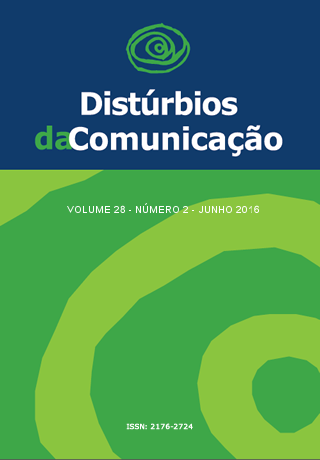Desvantagem vocal de pacientes disfônicos pré e pós-terapia fonoaudiológica em grupo
Palavras-chave:
voz, disfonia, autoavaliação, fonoterapia, treinamento da voz, processos grupaisResumo
Introdução: A terapia em grupo é vista como educativa e potencialmente efetiva. Objetivo: Avaliar a desvantagem vocal pré e pós-terapia fonoaudiológica em grupo para pacientes disfônicos, bem como associar a desvantagem vocal pós-terapia às variáveis: sexo, uso profissional da voz e diagnóstico laríngeo. Material e Métodos: Trata-se de uma pesquisa de intervenção com 50 pacientes disfônicos, de ambos os sexos, com média de 45,43 anos. O protocolo Índice de Desvantagem Vocal (IDV) foi aplicado no primeiro e no último encontro da intervenção. A terapia foi realizada em oito encontros semanais, tendo como foco a abordagem eclética. Realizou-se estatística descritiva e inferencial a partir do teste t de Student para comparar os momentos, e Qui-quadrado para verificar associação entre variáveis independentes com o IDV Total pós-terapia. Resultados: A maioria dos participantes era do sexo feminino e não fazia uso profissional da voz. Houve maior predomínio de pacientes com diagnóstico de lesão na porção membranosa da prega vocal. Ao comparar os domínios do IDV no momento pré e pós-terapia em grupo, nota-se uma diminuição dos escores totais e dos domínios emocional e orgânico do instrumento, porém esta redução não foi estaticamente significante. Quando realizada associação entre o escore total IDV pós-terapia com as variáveis: sexo, uso profissional da voz e diagnóstico laríngeo, observou-se significância em todas essas associações. Conclusão: Não houve redução significante dos valores dos domínios do IDV pós-terapia em grupo. A diminuição desses valores mostrou-se influenciada pelo sexo, uso profissional da voz e diagnóstico laríngeo dos pacientes.
Downloads
Métricas
Downloads
Publicado
Edição
Seção
Licença
Copyright (c) 2016 Vanessa Evellin Fernandes Isidro Gomes, Ingrid Jessie Freitas Coutinho França, Emanuelle Sintya Santos Santana do Nascimento, Maria Fabiana Bonfim Lima-Silva, Anna Alice Figueirêdo de Almeida

Este trabalho está licenciado sob uma licença Creative Commons Attribution 4.0 International License.









